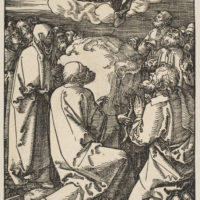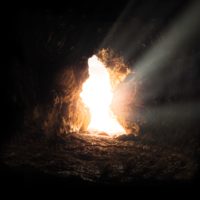Soon after I started working as a pastor here in the U.S., I learned that there are certain sacred days that you just have to observe when you live here. Fortunately, all of them are printed in my handy clergy desk calendar. And so for today it says, ‘Super Bowl’.
Now I know that the Super Bowl is mentioned in here as a warning: pastors, don’t plan anything important on this Sunday, because not many will show up for it. On this day, many people prefer to follow that other religion, pro football; and instead of following the gospel of our Lord, they are seeking for good news in a different place in life.
Of course, as a German, I know that pretty much every nation has its idolized sports – in Germany, we speak of ‘Kӧnig Fuβball’, ‘King Soccer’, and there is just as much fanaticism about it than about American pro football.
But I want to talk about the Super Bowl today, because that’s something we’ve all heard and/or seen something about in the past few weeks.
Although I don’t care for football, and for me the whole hype here in San Francisco is more an annoyance than anything else, I can’t help but be fascinated by the whole phenomenon. For many, the Super Bowl is the highlight of the year. Parties are celebrated everywhere. People spent an insane amount of money to see their team play – and hopefully win. It’s not just that they have to shell out thousands of dollars for a ticket, no, they have to book flights, they are willing to pay top dollar for a dingy motel room, and spend more money on team memorabilia.
It’s a shining moment in the year of sports. People are ecstatic to be a part of it, ‘koste es, was es wolle’ – it doesn’t matter how much it costs.
Now the thing is that many of the fans are not necessarily wealthy. These are often regular Joes and Janes, who have low- or middle-income jobs. These are people who deal with the issues of the majority of people in this country: eking out an existence, struggling to pay their bills, worried about the future of their children. For many, it’s a life weighed down by struggles. However, it’s the highlight of the year.
Not that all is just shiny and bright around Super Bowl 50. Where there is light, there also is shadow. It is estimated that thousands of sex slaves have been trafficked to the Bay Area to fulfill the more carnal desires of Super Bowl revelers. Alcohol and drug abuse abound. The homeless of this City, vulnerable to begin with, had to ‘relocate’ and give up their relatively safe sleeping grounds in and near those places where they could be noticed by visitors. And, alas, there is the corporate greed we experience around the Super Bowl.
But, in general, sports is a welcome escape. No matter, how hard your life is, you get to identify with a team, you partake in their losses – and wins. In following a sports team, you have a fellowship with the like-minded, an instant comradery, you belong – you just gotta show your colors. And, if your team is successful, you get to be part of the success, you feel like a winner yourself. You get to bask in the spotlight, you get to bask in the glory. And even though you have to go back to your regular life somehow, for a year you get to brag: we are the champions, my friends! And you can show this by proudly wearing the cap or the jersey with your team’s insignia.
If your team loses – well, you get to rant for a year how your team was at a disadvantage, or how the referees favored the other team, and, by the way, the whole thing is rigged to begin with. It smarts being second, especially because in this country we don’t have an honorary title like the Germans give to teams in soccer, like ‘Vizemeister’ – Vice Champions. Here in the U.S., there can only be one.
You may ask what all this has to do with today’s gospel about the so called Transfiguration of our Lord. In today’s gospel story, we arguably have one of the highlights in the life of Jesus. After walking the plains of Galilee and Judea, after teaching the people, after healing many of their ills, and after announcing to his disciples that he would have to go to Jerusalem to suffer and die, Jesus takes Peter, James, and John up to the mountaintop. Now the disciples have paid a high price for following Jesus – they have given up their families, their jobs, their status in the community. They found a new identity in following their master, they found a new family, as Jesus himself calls all who follow him brothers and sisters.
And it seems that, on the mountaintop, it all pays off. Jesus is transfigured before their eyes into a dazzling figure; moreover, he is in the presence of Moses and Elijah, two revered leaders of Israel’s past glory days. This is a bright and shining moment. And the disciples become a part of this glory, they get to bask in it.
Of course this amazing event on the mountaintop is preferable to the grind in the valley. Of course basking in the glory of Christ is a great escape from the suffering and the burdens down below, and the knowledge that, at the end of the way, there is Jerusalem and the cross. ‘How good, Lord, to be here’, we hear Peter say. He seems swept up by the ecstasy of the moment, and, just like his post-modern counterparts who long to hold on to the glorious moments in sports with team memorabilia, he wants to build something that lasts, something that prolongs and commemorates this bright and shining moment.
Alas, his intentions are shattered by a cloud and God’s terrifying voice: This is my Son, my Chosen; listen to him! Listen to him – it’s not just about seeing the glory and basking in it, but rather about listening to Jesus’ words. And Jesus’ words are quite clear: they are about loving the neighbor and the enemy, they are about justice, they are about his own suffering for the sake of the world, they are about a turn-around. Jesus talks about the valley we all have to spend our days, albeit in the presence of God and in community with our brothers and sisters.
So why the display of glory on the mountaintop? It is not by chance that the transfiguration is framed by Jesus’ first and second foretelling of his suffering and death. These are like bookends to the scene on the mountaintop. Christ’s glory is revealed, paradoxically, in his suffering and death. It is too early for the disciples to understand this. There is a reason why, just after the transfiguration, we have the story of a failed healing through the disciples. They don’t have the faith yet necessary to move mountains – and heal the afflicted themselves. Eventually, they will. And the world would be changed forever.
We all need our mountaintop experiences, bright moments of glory in our lives. We need those moments when everything is clear, when we feel that we are part of something greater than we are. We need holy days like Christmas and Easter, when we feel nourished and strengthened by the joy and exultation. And Lord, how good to be there. But eventually, for all of us, the way leads back to the valley with its strive. However, we don’t just get to wear a champion team’s jersey or cap for a year – we get to reflect the glory of God wherever we go, this day, every day. And the light shines the brightest in the low and dark places in this world; where people grieve, where people hurt, where people are desperate and in need. This is where the light is needed most. This is where we are called to go. This is where we all will experience the glory of the Lord and a world transfigured.





